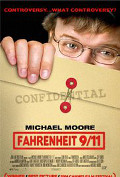
Directed by
Michael Moore
Rated M
Reviewed by
Bruce Paterson

Fahrenheit 9/11
Synopsis: Michael Moore, now one of the world's best-known social critics and media activists, targets George W Bush in a passionate argument about why and how the US elected a friend of the Bin Laden family as President and invaded Iraq.Moore, creator of the TV series The Awful Truth, broke into the wider public consciousness with the documentary Bowling for Columbine, a search for the causes of American violence. In Fahrenheit 9/11, some of the themes are familiar - the use of fear, power and money to manipulate America and the world. Moore's trademark is a free mix of fact and opinion, creative visual use of interviews, news media and popular culture, and a passion for the marginalised sides of the story. The results, even if unbalanced, are a provocative counterbalance to the mainstream media. And they seem to be electrifying America.
With the open aim of unseating the government of the world's superpower at its next election, Fahrenheit 9/11 is more an argument rather than a documentary.there is naturally much criticism of Moore's "facts" or the context they're presented in. Many of Moore's critics accept some of his assertions while dismissing the whole as unbalanced populism. For me, the criticism does undermine some of Moore's approach, but not the overall flavour of the film.
The film is roughly structured around three main topics. The first builds the backstory: the controversial election of Bush; his family's financial and personal relationship with the Bin Laden family and other Saudi Arabian elites; and his half-hearted approach to capturing Osama in Afghanistan. The second looks at internal US issues such as the passing of the intrusive Patriot Act, and provides some emotional foundation through a focus on the war's effects on one US patriotic family who lost a son to the war. The third part deals with Iraq, featuring interview segments with soldiers and locals on the ground.
Fahrenheit 9/11 isn't compulsory viewing for those interested in the issues; at least if they have already been following the debates about the legitimacy of Bush's election and subsequent Iraqi war. But it's well made, particularly with the use of sound - like the radio chatter over a black screen at the beginning of the film. And it is in parts enjoyable, funny, confronting, moving, shocking and provocative. And you don't often get that in the cinema.

Want more about this film?


Want something different?




